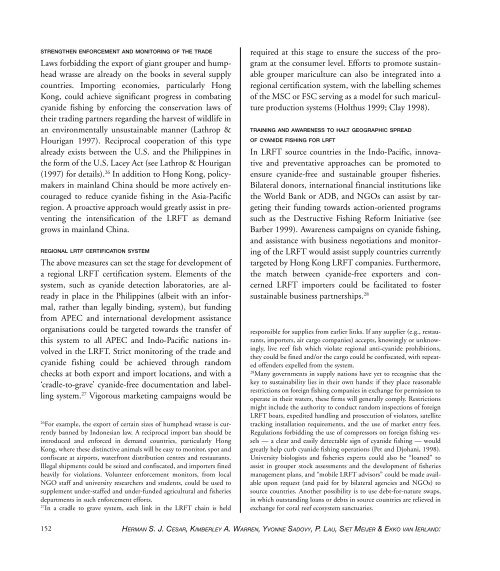Create successful ePaper yourself
Turn your PDF publications into a flip-book with our unique Google optimized e-Paper software.
STRENGTHEN ENFORCEMENT AND MONITORING OF THE TRADE<br />
Laws forbidding the export <strong>of</strong> giant grouper and humphead<br />
wrasse are already on the books in several supply<br />
countries. Importing economies, particularly Hong<br />
Kong, could achieve significant progress in combating<br />
cyanide fishing by enforcing the conservation laws <strong>of</strong><br />
their trading partners regarding the harvest <strong>of</strong> wildlife in<br />
an environmentally unsustainable manner (Lathrop &<br />
Hourigan 1997). Reciprocal cooperation <strong>of</strong> this type<br />
already exists between the U.S. and the Philippines in<br />
the form <strong>of</strong> the U.S. Lacey Act (see Lathrop & Hourigan<br />
(1997) for details). 26 In addition to Hong Kong, policymakers<br />
in mainland China should be more actively encouraged<br />
to reduce cyanide fishing in the Asia-Pacific<br />
region. A proactive approach would greatly assist in preventing<br />
the intensification <strong>of</strong> the LRFT as demand<br />
grows in mainland China.<br />
REGIONAL LRTF CERTIFICATION SYSTEM<br />
The above measures can set the stage for development <strong>of</strong><br />
a regional LRFT certification system. Elements <strong>of</strong> the<br />
system, such as cyanide detection laboratories, are already<br />
in place in the Philippines (albeit with an informal,<br />
rather than legally binding, system), but funding<br />
from APEC and international development assistance<br />
organisations could be targeted towards the transfer <strong>of</strong><br />
this system to all APEC and Indo-Pacific nations involved<br />
in the LRFT. Strict monitoring <strong>of</strong> the trade and<br />
cyanide fishing could be achieved through random<br />
checks at both export and import locations, and with a<br />
‘cradle-to-grave’ cyanide-free documentation and labelling<br />
system. 27 Vigorous marketing campaigns would be<br />
26<br />
For example, the export <strong>of</strong> certain sizes <strong>of</strong> humphead wrasse is currently<br />
banned by Indonesian law. A reciprocal import ban should be<br />
introduced and enforced in demand countries, particularly Hong<br />
Kong, where these distinctive animals will be easy to monitor, spot and<br />
confiscate at airports, waterfront distribution centres and restaurants.<br />
Illegal shipments could be seized and confiscated, and importers fined<br />
heavily for violations. Volunteer enforcement monitors, from local<br />
NGO staff and university researchers and students, could be used to<br />
supplement under-staffed and under-funded agricultural and fisheries<br />
departments in such enforcement efforts.<br />
27<br />
In a cradle to grave system, each link in the LRFT chain is held<br />
required at this stage to ensure the success <strong>of</strong> the program<br />
at the consumer level. Efforts to promote sustainable<br />
grouper mariculture can also be integrated into a<br />
regional certification system, with the labelling schemes<br />
<strong>of</strong> the MSC or FSC serving as a model for such mariculture<br />
production systems (Holthus 1999; Clay 1998).<br />
TRAINING AND AWARENESS TO HALT GEOGRAPHIC SPREAD<br />
OF CYANIDE FISHING FOR LRFT<br />
In LRFT source countries in the Indo-Pacific, innovative<br />
and preventative approaches can be promoted to<br />
ensure cyanide-free and sustainable grouper fisheries.<br />
Bilateral donors, international financial institutions like<br />
the World Bank or ADB, and NGOs can assist by targeting<br />
their funding towards action-oriented programs<br />
such as the Destructive Fishing Reform Initiative (see<br />
Barber 1999). Awareness campaigns on cyanide fishing,<br />
and assistance with business negotiations and monitoring<br />
<strong>of</strong> the LRFT would assist supply countries currently<br />
targeted by Hong Kong LRFT companies. Furthermore,<br />
the match between cyanide-free exporters and concerned<br />
LRFT importers could be facilitated to foster<br />
sustainable business partnerships. 28<br />
responsible for supplies from earlier links. If any supplier (e.g., restaurants,<br />
importers, air cargo companies) accepts, knowingly or unknowingly,<br />
live reef fish which violate regional anti-cyanide prohibitions,<br />
they could be fined and/or the cargo could be confiscated, with repeated<br />
<strong>of</strong>fenders expelled from the system.<br />
28<br />
Many governments in supply nations have yet to recognise that the<br />
key to sustainability lies in their own hands: if they place reasonable<br />
restrictions on foreign fishing companies in exchange for permission to<br />
operate in their waters, these firms will generally comply. Restrictions<br />
might include the authority to conduct random inspections <strong>of</strong> foreign<br />
LRFT boats, expedited handling and prosecution <strong>of</strong> violators, satellite<br />
tracking installation requirements, and the use <strong>of</strong> market entry fees.<br />
Regulations forbidding the use <strong>of</strong> compressors on foreign fishing vessels<br />
— a clear and easily detectable sign <strong>of</strong> cyanide fishing — would<br />
greatly help curb cyanide fishing operations (Pet and Djohani, 1998).<br />
University biologists and fisheries experts could also be “loaned” to<br />
assist in grouper stock assessments and the development <strong>of</strong> fisheries<br />
management plans, and “mobile LRFT advisors” could be made available<br />
upon request (and paid for by bilateral agencies and NGOs) to<br />
source countries. Another possibility is to use debt-for-nature swaps,<br />
in which outstanding loans or debts in source countries are relieved in<br />
exchange for coral reef ecosystem sanctuaries.<br />
152<br />
HERMAN S. J. CESAR, KIMBERLEY A. WARREN, YVONNE SADOVY, P. LAU, SIET MEIJER & EKKO VAN IERLAND:


















